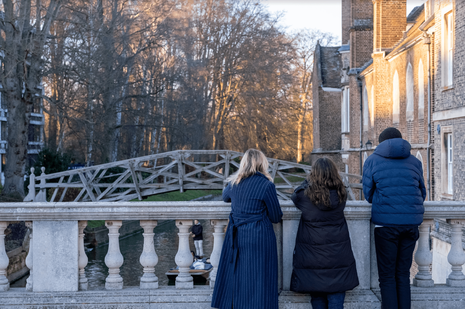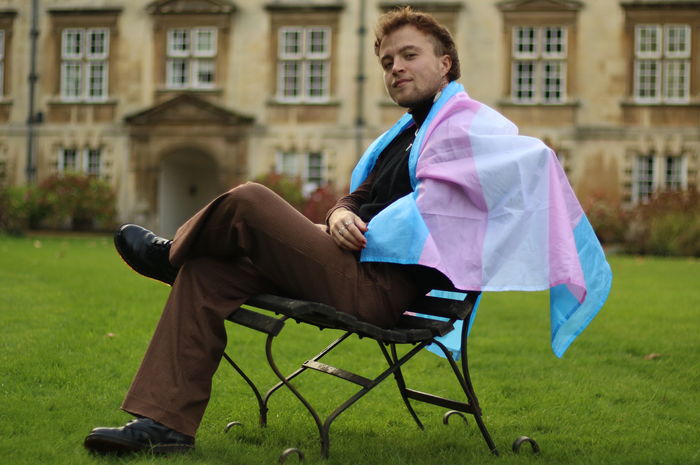The first Foundation Year students at Cambridge
The foundation year students have found themselves at the centre of a debate about access and Oxbridge admissions- we spoke to them to find out how they have found the course so far

Last April, 52 students were offered places on the Cambridge Foundation Year. The media attention arrived soon after: their faces plastered across websites, their names in national newspapers.
The new pre-degree Foundation Year in the Arts, Humanities and Social Sciences is the first of its kind at Cambridge. Free and fully-funded, the programme was created to offer a stepping stone to Cambridge for those impacted by educational disadvantage and disruption.
The application process is independent from traditional undergraduate applications, with a later deadline and eligibility criteria recognising different types of disadvantage, from bereavement and health issues to school performance and household income. “It’s a really supportive scheme with staff who understand that everyone has suffered disruption in multiple different ways,” says Sadia, a Foundation Year student from East London.
“It felt very alienating, and like I didn’t belong”
Annabel, who, like Sadia, is studying at Murray Edwards, says that being part of such a diverse year group has meant support and understanding from staff and peers alike: “There’s really zero judgement and it’s just the most lovely group of people, ever.”
Sadia and Annabel’s enthusiasm for the course is contagious: they talk about field trips to museums and poetry archives, about being able to experience Cambridge without the pressure of pursuing only one subject. The multi-disciplinary curriculum is designed to prepare students for the rigour of a Cambridge degree, and is taught through lectures, supervisions, and seminars, with regular assessments during term.
“The course topics really go beyond the typical white British or Eurocentric vision. They’re centred around intersectionality and the various forms of oppression we overlook,” says Sadia. “In Michaelmas, I studied Generation Windrush poetry and we looked at how black migrants used poetry as a form of protest. In another paper, we studied how ethnic minorities might have been increasingly disadvantaged because of Covid.” Other papers offered include studies of South Asian religions, the human body in art, and the political significance of spaces of worship.
As the first-ever participants in a new programme, these students have found themselves at the centre of a debate about access and Oxbridge admissions. This discourse has reached Cambridge, with an anonymous Camfess post expressing doubts about ‘watering down the reputation of a Cambridge degree’. Typical offers for the Foundation Year require 120 UCAS Tariff Points, or BBB at A-Level, while usual Cambridge offers require A*AA or above.
“What’s not understood is that it’s not lowering standards at all,” explains Annabel. “These are students who could have got these very high grades, but weren’t able to due to extenuating circumstances out of their control.”
“Excitement fades, and worry sets in: will I fit in?”
The Foundation Year students don’t have much control over this discourse, but they suffer its consequences. “I love the course, but I think people have been really harsh,” says one student who wished to stay anonymous. She tells me about students who ceased speaking to her once they found out she was on the Foundation Year, and about sharing accommodation with students who say the course shouldn’t exist. “It felt very alienating, and like I didn’t belong,” she says.
Fears of experiencing this kind of institutional bias and cultural isolation pose a major barrier in widening access in Cambridge admissions. The Foundation Year is aimed at those who might not have otherwise applied to Oxbridge - the care-experienced, young parents, or students from disadvantaged backgrounds. For many such students, Oxbridge’s wood-panelled halls are still seen as impenetrable bastions of privilege. Excitement fades, and worry sets in: will I fit in? “Would they want to apply for the Foundation Year and be excluded from everybody else?” asks Sadia. “The label ‘Foundation Year student’ is another layer to consider in addition to class and race.”
One student suggests that the programme’s branding is implicitly othering, separating its students from the rest of the undergraduate body. “Because of the name ‘Foundation Year’, people don’t realise that the criteria for the course is the hardship that we’ve gone through,” she says. “Some people on the Foundation Year don’t have homes to go back to, and it’s hard.”
There is a complicated ensemble of factors at play here, and no easy solution. Despite this, the students I spoke with were unanimous in their enthusiasm for the course itself. Each of them express their hopes of progressing to degree courses at Cambridge, and speak passionately about the teaching and their year group. “You get to experience Cambridge life and test everything out for yourself,” said Sadia, “and I definitely want to stay on.”
A University spokesperson told Varsity: “We are committed to offering students with the potential to succeed at the University the chance of a Cambridge education regardless of their background. From the announcement of the Foundation Year through to the arrival of our first students, we have emphasised the importance of the programme’s selection criteria in reaching students who might not have otherwise applied to Cambridge - immensely talented individuals who have been prevented from reaching their full potential by their circumstances.
“We recognise that fitting in can sometimes be a challenge, but one that can be overcome with the necessary support. Any Cambridge student can access support by speaking to their college tutor in the first instance.”
 News / Cambridge students set up encampment calling for Israel divestment6 May 2024
News / Cambridge students set up encampment calling for Israel divestment6 May 2024 News / Cambridge postgrad re-elected as City councillor4 May 2024
News / Cambridge postgrad re-elected as City councillor4 May 2024 News / Some supervisors’ effective pay rate £3 below living wage, new report finds5 May 2024
News / Some supervisors’ effective pay rate £3 below living wage, new report finds5 May 2024 Fashion / Class and closeted identities: how do fits fit into our cultures?6 May 2024
Fashion / Class and closeted identities: how do fits fit into our cultures?6 May 2024 News / Academics call for Cambridge to drop investigation into ‘race realist’ fellow2 May 2024
News / Academics call for Cambridge to drop investigation into ‘race realist’ fellow2 May 2024






